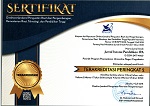The Study of Social Justice in Pancasila, Islam, and Hinduism Perspective
Abstract
This study aimed to analyze the concept of social justice from Pancasila, Islam and Hinduism perspectives. This study used a qualitative method with literature study techniques to explain ideas related to the concept of justice from Pancasila, Islamic and Hindu perspectives. The concept of justice in Pancasila was defined as a principle that requires all elements, i.e. citizens and the government, to be fair in all areas of life, both material and spiritual, by placing things according to their portion or place without taking sides. Justice in the Islamic perspective could be extracted from QS Al-Baqarah [2]: 148, requiring everyone to compete to do good, known as fastabiqul khairat. Every goodness will, of course, be replaced with a gift. Therefore, justice played a role in giving gifts according to the good that had been done. On the other hand, justice in the Hindu perspective emphasized the balance between the rights obtained and the obligations carried out based on their social position, either individually or collectively.
Keywords
Full Text:
PDFReferences
Al-Uyun, D. (2012). Ilmu Negara. Malang: Universitas Brawijaya Press.
Alfurkan, A., & Marzuki, M. (2020). Penguatan Nilai Kejujuran melalui Pendidikan Antikorupsi di Sekolah. Jurnal Ilmiah Pendidikan Pancasila dan Kewarganegaraan, 4(2), 221-231.
Almas, B. (2019). Keadilan Redistribusi Perspektif Islam. Jurnal Ekonomi Islam, 8(1), 33-73.
Almubarok, F. (2018). Keadilan dalam Perspektif Islam. Jurnal Pendidikan dan Pemikiran Islam, 1(2), 115-143.
Amin, M. (2014). Konsep Keadilan dalam Perspektif Filsafat Hukum Islam. Jurnal Hukum dan Perundangan Islam, 4(02), 322-343.
Ardiyasa, I. N. S., & Muliada, P. A. G. (2021). Pendidikan Karakter: Perspektif Hindu. Makalah disajikan dalam Seminar Bahasa Daerah, Buleleng: Sekolah Tinggi Agama Hindu Negeri Mpu Kuturan Singaraja.
Arli, A. I. (2020). Pengaruh Service Recovery terhadap Customer Loyality dengan Customer Satisfaction sebagai Variabel Intervening pada Pelanggan PT. Tiki Jalur Nugraha Ekakurir (JNE) di Jl. Yusuf Daeng Ngawing No. 6 Makassar. Makassar: Universitas Islam Negeri Alauddin Makassar.
De Saint-Cheron, M., & Spaak, A. N. (2017). Gandhi: Anti-Biography of a Great Soul. London: Routledge.
Etieyibo, E. (2011). Privatization in Nigeria, Social Welfare, and the Obligation of Social Justice. Journal of Economics, 2(1), 37-44.
Fatihin, R. (2017). Keadilan Sosial dalam Perspektif Al-Qur’an dan Pancasila. Jurnal Penelitian Agama dan Masyarakat, 1(2), 293-314.
Fitriani, F. (2020). Sejarah Agama-Agama. Deli Serdang: Universitas Islam Negeri Sumatera Utara.
Harun, N. (2013). Makna Keadilan dalam Perspektif Hukum Islam dan Perundang-Undangan. Jurnal Ilmiah Al-Syir’ah, 11(1), 1-15.
Herawati, Y. (2014). Konsep Keadilan Sosial dalam Bingkai Sila Kelima Pancasila (The Concept of Social Justice Within the Fifth Principle Framework of Pancasila). Jurnal Masalah Sosial, Politik, dan Kebijakan, 18(1), 28-38.
Hikam, M. A. S., & Magnis-Suseno, F. (1996). Demokrasi dan Civil Society. Jakarta: LP3ES.
Husna, N. (2014). Ilmu Kesejahteraan Sosial dan Pekerjaan Sosial. Jurnal Al-Bayan: Media Kajian dan Pengembangan Ilmu Dakwah, 20(1), 45-57.
Joyo, P. R. (2017). Harmoni Nilai-Nilai Pancasila dalam Agama Hindu. Jurnal Penerangan Agama Hindu, 15(2), 73-87.
Kartika, N. G. A. (2018). Filsafat Pancasila dalam Perspektif Hindu. Vyavahara Duta, 13(1), 1-12.
Mansir, F. (2018). Diskursus Pendidikan Karakter di Perguruan Tinggi Keagamaan Islam pada Era Milenial. Tadrib, 4(2), 280-300.
Mansir, F. (2018). Pendekatan Psikologi dalam Kajian Pendidikan Islam. Jurnal Psikologi Islami, 4(1), 61-73.
Mansir, F. (2019). Implications of Teacher Certification on Professionalism and Welfare of 21th Century PAI Teachers. Tadrib, 5(2), 138-152.
Mansir, F. (2020). Diskursus Sains dalam Kurikulum Pendidikan Agama Islam di Sekolah dan Madrasah Era Digital. Jurnal Ilmu Agama, 3(2), 144-157.
Mansir, F. (2020). The Leadership of Personnel Management in Islamic Education: Emerging Insights from an Indonesian University. Jurnal Pendidikan Islam, 5(1), 1-16.
Mansir, F. (2021). Aktualisasi Pendidikan Agama dan Sains dalam Character Building Peserta Didik di Sekolah dan Madrasah. Jurnal Pendidikan Agama Islam, 7(2), 87-93.
McLaughlin, A. M., Gray, E., & Wilson, M. (2015). Child Welfare Workers and Social Justice: Mending the Disconnect. Children and Youth Services Review, 59(2015), 177-183.
McLaughlin, E., & Baker, J. (2007). Equality, Social Justice and Social Welfare: A Road Map to the New Egalitarianism. Social Policy and Society, 6(1), 53-68.
Midgley, J. (2007). Perspectives on Globalization, Social Justice and Welfare. The Jounal of Sociology & Social Welfare, 34(2), 17-36.
Parhan, M., & Sukaenah, S. (2021). Pendekatan Kontekstual dalam Meningkatkan Pembelajaran Pendidikan Pancasila dan Kewarganegaraan di Sekolah Dasar. Jurnal Ilmiah Pendidikan Pancasila dan Kewarganegaraan, 5(2), 360-368.
Praja, J. S. (2020). Aliran-Aliran Filsafat dan Etika. Jakarta: Prenada Media Group.
Rangkuti, A. (2017). Konsep Keadilan dalam Perspektif Islam. Jurnal Pendidikan Islam, 6(1), 1-21.
Sarwono, J. (2006). Metode Penelitian Kuantitatif dan Kualitatif. Yogyakarta: Graha Ilmu.
Subagiasta, I. K. (2007). Sekilas tentang Wanita dalam Perspektif Susastra Hindu. Jurnal Seni Budaya, 21(2), 1-9.
Sujana, I. P. W. M., & Suastika, I. N. (2019). Menggagas Penguatan Kajian Akhlak Kewarganegaraan (Civic Virtue) Perspektif Hindu dalam Masyarakat Multikultural. Makalah disajikan dalam Seminar Nasional Inovasi dalam Penelitian Sains, Teknologi dan Humaniora-InoBali, Denpasar: Universitas Dwijendra.
Welsh, P. J., & Parsons, C. (2006). Social Justice, Service Delivery and Welfare: Reform the Politics of Deprivation, Disaffection and Education in the District of Thanet. Education, Citizenship and Social Justice, 1(1), 39-57.
Wijaya, D. N. (2016). Montesquieu dan Makna sebuah Keadilan. Jurnal Ilmiah Pendidikan Pancasila dan Kewarganegaraan, 1(2), 79-84
DOI: http://dx.doi.org/10.17977/um019v7i2p342-348
Refbacks
- There are currently no refbacks.
Copyright (c) 2022 Jurnal Ilmiah Pendidikan Pancasila dan Kewarganegaraan

This work is licensed under a Creative Commons Attribution 4.0 International License.
View My Stats










